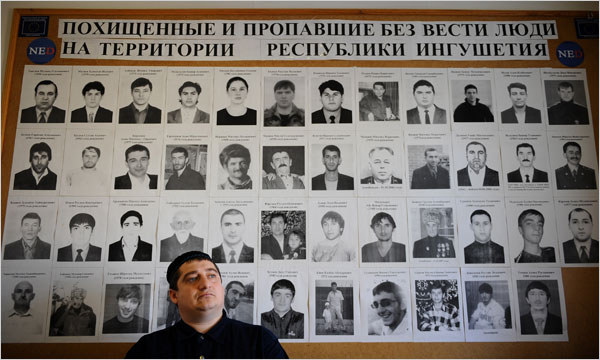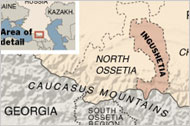Magomed Mutsolgov of MAShR, a nongovernmental organization that tracks regional violence, and the portraits of some of those missing in Ingushetia.
NAZRAN, Russia — Something is changing in Ingushetia, the tiny tinderbox of a republic that neighbors Chechnya.
The new president, Yunus-Bek Yevkurov, has ordered security barriers removed from most government offices, reasoning that authorities should not need protection from their own people. He rents a modest house from a retired state prosecutor, expressing some discomfort with the gold-domed presidential palace.
And in a region where criticism of the government has been all but forbidden, Mr. Yevkurov seems to be soliciting it. In his first 100 days in office, he met at least seven times, three times in private, with a human rights activist who dogged his predecessor, and he established a telephone line for citizens to air their grievances.
Whether this new approach can bring Ingushetia under control is another question — and a crucial one for Russia. Soon it will be spring, marking a new season of war between armed Ingush militants and the federal forces struggling to control them. Left to deteriorate, Ingushetia could become another Chechnya, spreading chaos on Russia’s southern border.
President Dmitri A. Medvedev of Russia, inheriting the problem of Ingushetia, has chosen a different path from his mentor, Vladimir V. Putin. In October, Mr. Medvedev responded to mounting civil unrest by removing the republic’s unpopular leader. He brought in Mr. Yevkurov, a devout Ingush Muslim and a Russian military intelligence officer, and set about the task of winning back popular trust in an atmosphere charged with violence.
“Yevkurov is balancing right now,” said Grigory Shvedov, editor of the Web-based news service Caucasian Knot. “Let’s see how successful he will be in balancing. Clearly he needs results that are close to impossible.”
Crossing into the republic of Ingushetia is like entering another country. Pedestrians must register at an office plastered with wanted posters — men in their teens and 20s sought as terrorists. Checkpoints are staffed by Russian federal troops wearing full camouflage and, often, face masks, and many passing cars have no license plates.
Slightly fewer than half a million people live here, in low-slung brick compounds surrounded by a slight wood-stove haze. Schoolchildren feel safe enough to make their way home in gathering dark, but behind the surface is a social shambles, with unemployment officially reported at 47.4 percent, the highest of any Russian republic.
During the Chechen war, hundreds of thousands of refugees flooded in and violence followed, as federal forces tried to hunt down fighters. Magomed Mutsolgov of MAShR, a nongovernmental organization that tracks violence in the region, said 170 people, mostly men, had disappeared since 2004 — presumably at the hands of security forces, he said. Often, their brothers and cousins respond by departing for “the forest,” where militant groups offer both money and a shot at revenge.
“I would compare this war to a fire on a peat bog,” Mr. Mutsolgov said. “You may not see the flame, but there is a fire.”
Tensions in Ingushetia increased Aug. 31 with the killing of Magomed Yevloyev, who operated an opposition Web site. Mr. Yevloyev happened to fly into Nazran on the same plane as the former president, Murat Zyazikov. He was arrested upon landing, and was found less than an hour later with a bullet wound to the head. Authorities said he had been shot accidentally while trying to take an officer’s gun.
About eight weeks later, Mr. Medvedev removed Mr. Zyazikov. Many here saw the decision as a change of course, something that could not have happened while Mr. Putin was in office. “People have become very suspicious of authority,” said Azamat Nalgiyev, 68, a former member of Parliament who came out of retirement to head Mr. Yevkurov’s new Human Rights Commission. “At the same time, they are dying to believe in someone.”
The new president is hardly a traditional liberal. He received Russia’s highest military honor, the Hero of Russia, for service that included leading the force that took control of the Pristina airport in Kosovo in advance of
NATO’s troops in 1999. In a recent interview with Novaya Gazeta, he said he believed that the English and American secret services were backing Islamic militants in Ingushetia as a way to “bring down Russia, just as the Soviet Union was brought down.”
Yet he has clearly loosened the strictures on political life. Last month, Mr. Yevkurov convened the Fifth Congress of Ingush Peoples — an event that Mr. Zyazikov never allowed, out of a fear of stoking separatist impulses. He has engaged human rights figures and other dissidents in intense discussions, persuading some to get involved in government initiatives. People speak of him glowingly.
“You feel a person could talk to him in simple, human language,” said Murat Barchiyev, 52, a retired bus driver. “He’s a decent man. I know now that at any time I can express my opinion.”
But the breach between the Ingush public and the federal authorities may be impassable.
Mr. Mutsolgov, of MAShR, was an ardent critic of Mr. Zyazikov, and for five years he peppered him with petitions but received no response. He said that Mr. Yevkurov, in contrast, had invited him to at least seven meetings, but that his hopes were already fading that Mr. Yevkurov could accomplish what he demanded: return Prigorodny Raion, a disputed district now located in North Ossetia, and restrain the activity of Russian federal forces in Ingushetia. Mr. Mutsolgov announced his withdrawal from the president’s human rights commission earlier this month.
“Yevkurov has received a lot of credit in the form of people’s hopes,” Mr. Mutsolgov said. “The more those hopes melt away, the worse it will be. And they are melting away.”
Melting — or exploding. Late on Feb. 12, a barrel of explosives weighing about 440 pounds detonated in a house on Gorovodzheva Street in Nazran. Federal forces had tracked a group of militants there, and the F.S.B., Russia’s domestic intelligence service, later reported that it had foiled a plan to assassinate the republic’s new leaders.
But it was not the militants who enraged Aslan Aushev, a 23-year-old Ingush police officer who had rushed to the scene to rescue his mother and 5-year-old sister. He was fuming over the Russian forces who had forced him to stand against a wall for two and a half hours, arguing openly about whether to shoot him and ignoring his protests that he was a police officer.
“They didn’t respect my rank,” he said of the federal troops. “I will never respect them.”
Mr. Aushev gave Mr. Yevkurov credit for visiting the neighborhood after the blast, saying it was a gesture Mr. Zyazikov never would have made. But the Russians, and his anger at them, blotted out everything else. Staring at a crater, all that was left of No. 8 Gorovodzheva Street, he spoke tonelessly.
“They used to say that when we got a new president, all this would stop,” Mr. Aushev said. “But now we have a new president, and it’s continuing.”























